GPS trackers are getting more popular for keeping vehicles safe and monitored. The market shows a big increase in demand for these devices. They help a lot in finding stolen vehicles and are used by businesses to track employees and assets.
Using GPS trackers helps in managing fleets better. They offer real-time tracking, alerts, and advanced features. These benefits lead to cost savings and better productivity.
Vehicle tracking devices give real-time GPS location data. This is key for keeping vehicles safe and monitored. Insurance companies give discounts to drivers who use GPS tracking tools. This is because these devices help drivers stay safe.
With more vehicle theft and fleet management issues, GPS trackers are now a must-have.

Key Takeaways
- GPS trackers are increasingly popular for vehicle security and monitoring.
- Vehicle tracking devices offer real-time GPS location data to enhance recovery rates in the event of theft.
- GPS trackers contribute to more effective fleet management and cost savings.
- Insurance companies provide discounts and rebates to drivers who install GPS tracking tools.
- GPS trackers are essential for ensuring vehicle security and monitoring, with various features tailored for specific user needs.
- Over 400,000 assets are currently protected by GPS tracking technology, with thousands of vehicles and belongings recovered using GPS Tracker Pro.
- GPS trackers can facilitate rapid location identification for dispatching emergency services, vital for saving lives.
Understanding the role of GPS trackers in vehicle security is key. It helps individuals and businesses decide to invest in these devices. With the increasing demand, it’s important to look into the benefits and features of GPS trackers.
Understanding GPS Trackers for Vehicles
GPS tracking devices are key for vehicle tracking and fleet management. They give real-time location updates. This helps fleet managers keep an eye on their vehicles and assets. It also boosts compliance, efficiency, and safety.
These devices help companies save on fuel, improve maintenance, and cut down on costs. There are various types of GPS trackers. Hardwired ones are best for fleet management because they’re reliable and hard to tamper with. Battery-powered trackers are good for personal use or short-term tracking.

GPS tracking devices offer many benefits. They make operations more efficient, reduce fuel use, and keep drivers safer. Companies can also check on driving habits. This leads to lower insurance costs and safer driving through feedback and rewards.
By using fleet management solutions, businesses can run better, save money, and make customers happier.
Key Benefits of Vehicle GPS Tracking
Vehicle tracking brings many benefits for both individuals and businesses. It helps in managing fleets and tracking assets. Companies can save on insurance, improve driver habits, and boost fleet efficiency. Studies show that using GPS tracking can cut fuel costs by 13.4% on average.
Some key benefits include:
- Reduced fuel costs through optimized routing and driver behavior
- Improved driver behavior due to increased accountability
- Enhanced fleet efficiency through real-time tracking and monitoring
- Streamlined maintenance schedules with automated reports and alerts
Vehicle tracking also gives peace of mind to individuals and businesses. It lets them know their vehicles and assets are safe. With real-time tracking, companies can quickly handle any problems, cutting downtime and boosting productivity.

By using GPS tracking, businesses can also enjoy features like geofencing. This alerts management to any unauthorized vehicle use. They can also analyze historical data to dispute claims and lower costs. Overall, vehicle tracking is a great tool for better fleet and asset management.
| Benefit | Description |
|---|---|
| Reduced Fuel Costs | Optimized routing and driver behavior lead to lower fuel expenses |
| Improved Driver Behavior | Increased accountability results in better driving habits |
| Enhanced Fleet Efficiency | Real-time tracking and monitoring enable more efficient fleet management |
Essential Features in Modern Vehicle Trackers
Modern vehicle trackers have become very advanced. They offer features that boost vehicle security, make operations more efficient, and give valuable insights. At the core are features like real-time monitoring. This lets users track their vehicles’ location and status instantly, helping them respond quickly to emergencies or misuse.
Geofencing is another key feature. It lets users set specific zones and get alerts when vehicles enter or leave these areas. This is super helpful for fleet managers to keep an eye on driver behavior and ensure vehicles stay within designated zones. Mobile app integration is also vital. It makes it easy for users to monitor their vehicles and get alerts on their phones.
Some of the main benefits of these features are:
- Improved vehicle security through real-time monitoring and geofencing
- Enhanced operational efficiency through mobile app integration and real-time tracking
- Valuable insights for owners and managers through historical data recording and analysis
By including these essential features, modern vehicle trackers offer a complete solution. They help improve security, efficiency, and productivity for vehicle owners and managers.
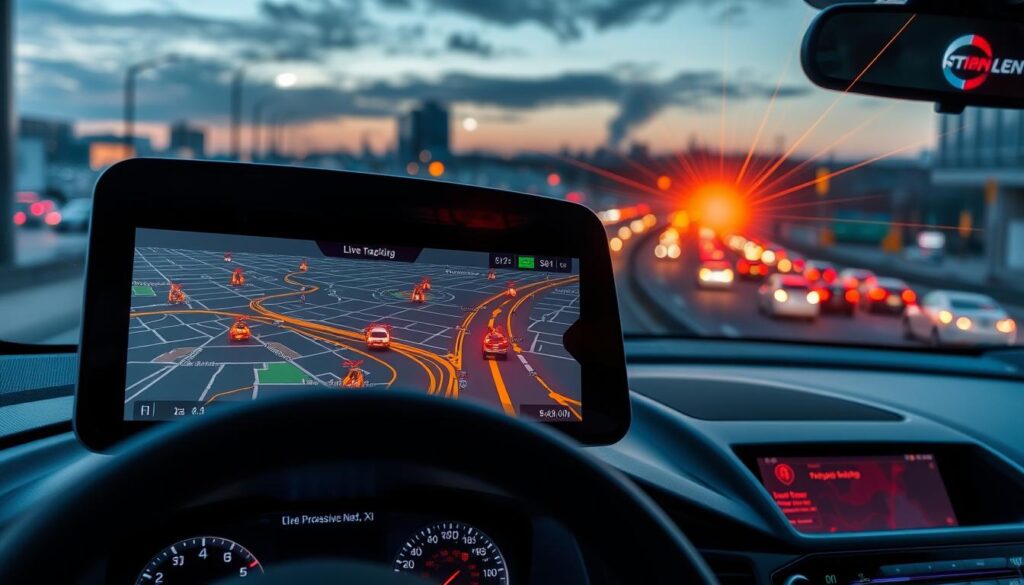
| Feature | Description |
|---|---|
| Real-time Monitoring | Track vehicle location and status in real-time |
| Geofencing | Define specific boundaries and receive alerts when vehicles enter or exit |
| Mobile App Integration | Monitor vehicles and receive alerts on smartphones |
Choosing the Right GPS Tracker for Your Vehicle
When picking a GPS tracker, think about your vehicle type and budget. There are many choices out there, making it hard to decide. But, by knowing what you need, you can pick the best GPS tracker for your vehicle.
Here are some key factors to consider when choosing a GPS tracker:
- Vehicle type: Different GPS trackers are made for different vehicles, like cars, trucks, or motorcycles.
- Budget: Prices vary from under $20 to over $100, based on the features and what it can do.
- Features: Think about what’s important to you, like tracking in real-time, setting boundaries, or getting alerts.
By looking at these points and doing your homework, you can find a GPS tracker that fits your needs and budget. Also, remember to check the monthly subscription costs, which can be from $15 to $50.

In conclusion, picking the right GPS tracker for your vehicle means thinking about several things. These include your vehicle type, budget, and what features you need. By researching and knowing what you want, you can find a GPS tracker that works well for you.
| GPS Tracker Feature | Description |
|---|---|
| Real-time tracking | Track your vehicle’s location in real-time |
| Geofencing | Set boundaries and receive alerts when your vehicle enters or exits a specific area |
| Alerts | Receive notifications for events such as speeding, accidents, or maintenance needs |
Installation Guide and Best Practices
There are two main ways to install a GPS tracker: DIY or professional installation. DIY is cheaper and easier, but you need some tech skills. Professional installation is more secure but costs more.
A professional installation is best for hardwired GPS trackers. It connects to the car’s electrical system. A skilled technician should do this to avoid damage. For a DIY installation, follow the maker’s guide closely and be careful.
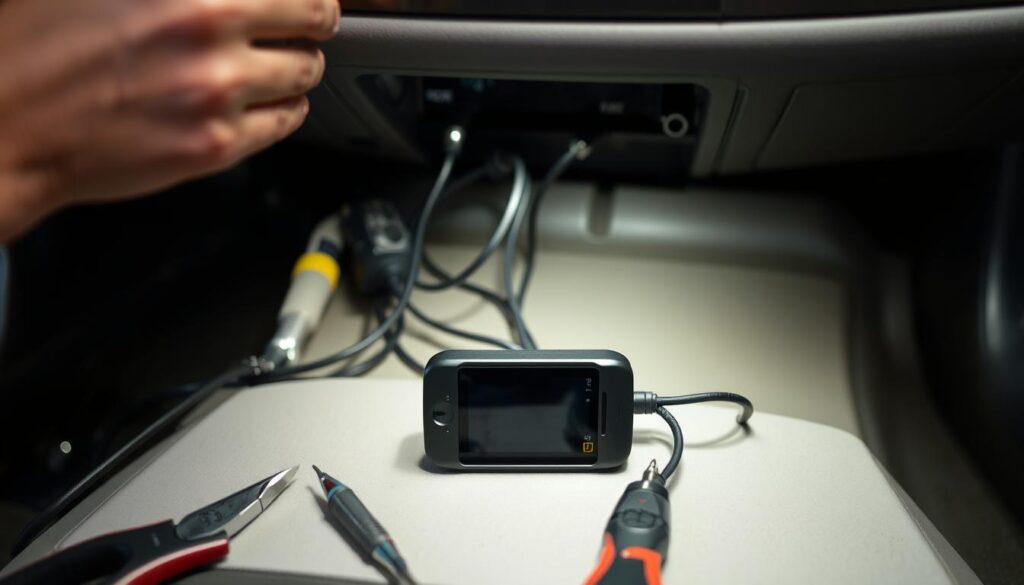
Where you place the GPS tracker is key. It should be safe and not block signals. Avoid mistakes like wrong wiring, bad mounting, and moisture damage. By following the guide and being careful, you can install a GPS tracker right, ensuring it works well.
Security Features and Anti-Theft Protection
Car theft is a big worry for car owners, with car thefts and vandalism going up a lot in the US. Luxury cars are often targeted because their parts are in high demand. This makes GPS tracker security a key part of keeping cars safe.
GPS trackers let you track your car’s location in real-time. They send alerts if your car moves outside a set area. This adds a layer of security and helps prevent vehicle theft.
Some main benefits of GPS trackers for anti-theft protection are:
- Real-time location monitoring
- Geofencing capabilities for immediate notification of vehicle movement
- Detection of harsh driving behaviors
- Enhanced security through real-time alerts and notifications

Adding GPS trackers to your car’s security system can greatly lower the chance of vehicle theft. It also brings more GPS tracker security and anti-theft protection.
| Feature | Benefit |
|---|---|
| Real-time location monitoring | Immediate notification of vehicle movement |
| Geofencing | Designated area monitoring for enhanced security |
| Harsh driving behavior detection | Promotion of safer driving habits |
Battery Life and Power Management
Battery life and power management are key when choosing GPS trackers. The battery life varies by device and use. Hardwired options for vehicles offer a steady power source. For wireless needs, there are battery-powered trackers that use little power.
Some GPS trackers are made to save energy. They have low-power mode and motion detection. These features help the battery last longer, perfect for long-term use. Some devices also send alerts when the battery is low, helping users recharge or replace it quickly.
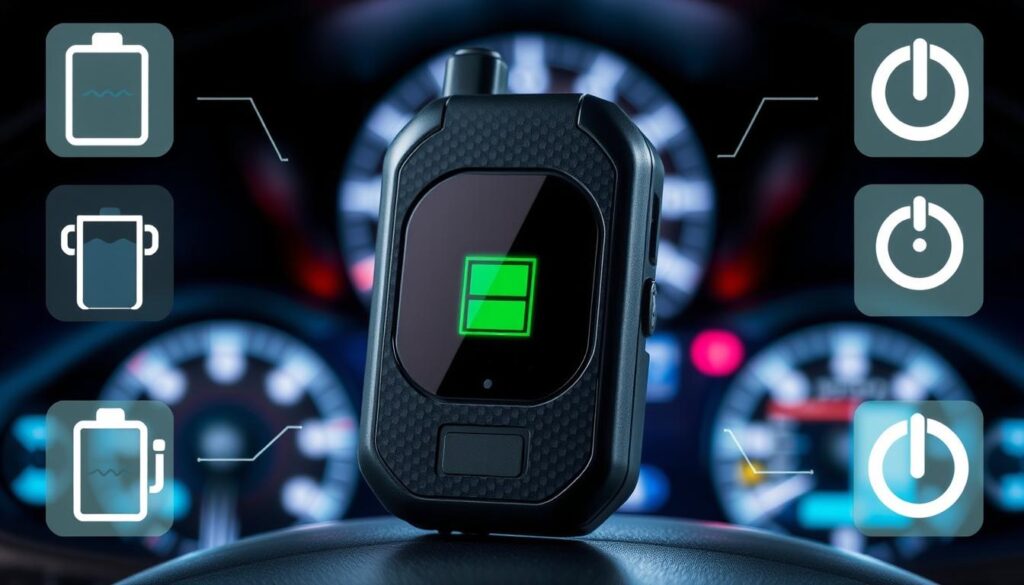
Choosing a GPS tracker with good power management is important. Look for features like automatic shutdown, sleep mode, and power-saving algorithms. These help reduce battery drain and keep the tracker working when you need it.
| GPS Tracker Type | Battery Life | Power Management Features |
|---|---|---|
| Battery-Powered | Up to 6 months | Low-power mode, motion detection |
| Hardwired | No battery required | Automatic shutdown, sleep mode |
When picking a GPS tracker, think about battery life and power management. Whether you choose hardwired or battery-powered, find one with efficient power management. This ensures it works well and needs less maintenance.
Real-Time Alerts and Notifications
GPS trackers offer real-time alerts and notifications. They help users keep up with their vehicle’s status. Alerts include speed alerts, movement updates, and battery status. These features boost vehicle security and management.
Some main benefits of these alerts and notifications are:
- Improved vehicle security with quick alerts for theft or unauthorized movement
- Enhanced driver safety with speed alerts to prevent accidents
- Increased efficiency in fleet management with real-time notifications on vehicle location and status
Users can quickly respond to any issues with real-time alerts and notifications. This could be a theft or a driver speeding. It helps prevent accidents and reduces theft risk.

GPS Tracking for Fleet Management
GPS tracking is a key tool for fleet management. It lets companies watch their vehicles’ location, speed, and more in real-time. This info helps them plan better routes, cut down on fuel use, and improve how drivers act.
Using GPS tracking, businesses can make their operations smoother, save money, and serve customers better.
Some key benefits of GPS tracking for fleet management are:
- Improved vehicle tracking and monitoring
- Enhanced driver behavior and management
- Increased operational efficiency and safety measures
- Reduced fuel consumption and costs
Companies like Geotab offer top-notch GPS tracking solutions. For example, the GO9 tracking device has a 32-bit processor and more RAM for quicker and more accurate data. It also has a GNSS module for faster and more precise location data. With GPS tracking, businesses can make smarter decisions to better their fleet management and operations.

GPS tracking for vehicle tracking also cuts down theft risk and boosts recovery chances. It helps companies plan better routes, cut idle time, and schedule maintenance better. With the right GPS tracking, companies can boost their fleet management and see big savings and efficiency gains.
Legal Considerations and Privacy
Using GPS trackers raises important legal and privacy issues. GPS tracking laws differ by state, so knowing your local rules is key. It’s vital to get consent before tracking someone’s movements.
In the U.S., the Supreme Court said the government needs a warrant to use GPS on people or property. This shows how critical data protection is. Some places, like California and Texas, need clear consent from workers before tracking them. But, in Illinois and Michigan, tracking company vehicles is okay without asking.
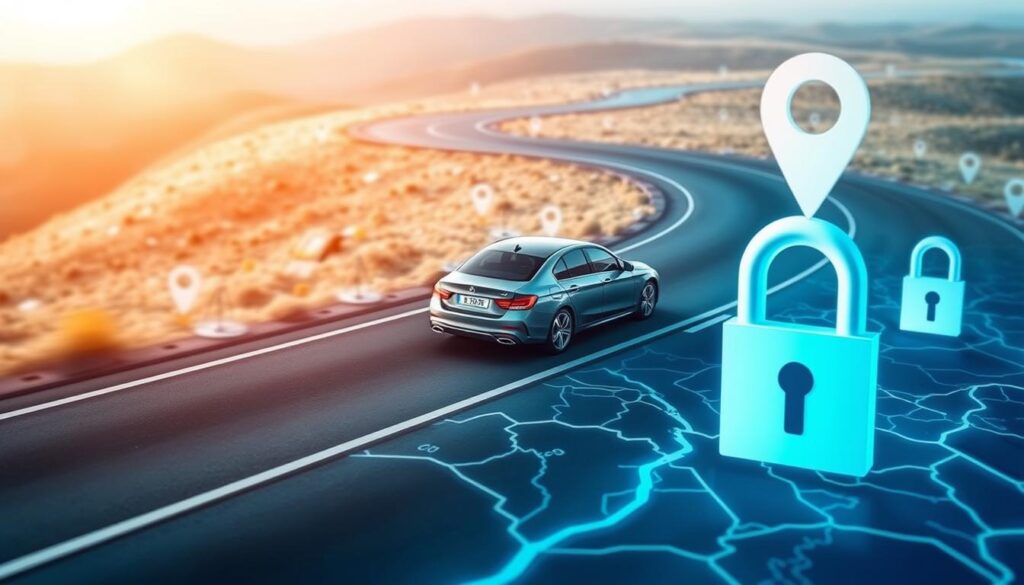
GPS tracking laws change a lot from place to place. For example, in Alabama, tracking is okay outside private areas. But in Alaska, tracking without consent that scares someone is illegal. Always check your local laws and get the right permissions before using GPS trackers.
Here are some important things to remember about GPS tracking laws and consent requirements:
- Always get clear consent before tracking someone’s location.
- Know the specific laws in your area.
- Use GPS tracking only for real business reasons.
- Make sure to tell people they’re being tracked.
Maintenance and Troubleshooting
Regular GPS tracker maintenance is key for your vehicle’s tracking system to work well. This means checking the battery, updating software, and doing routine checks to avoid problems.

For troubleshooting, having good technical support is vital. It helps fix issues fast, cutting down on downtime and its effects on your work. Some common problems include:
- Device malfunction or failure
- Software glitches or updates
- Connectivity problems or signal loss
By focusing on GPS tracker maintenance and having support for troubleshooting, your system will run smoothly. This gives you the data and insights needed for smart decisions. With the right technical support, you can reduce downtime and get the most from your GPS tracking system.
Cost Analysis and ROI
Thinking about using GPS trackers for vehicles? It’s key to look at the costs and how much you’ll save. The price of a GPS tracker can change based on its features. You might spend between $100 to $500 for each vehicle. Plus, there are monthly fees for the tracking software, which can be $20 to $50 per vehicle.
GPS tracking can save you money in many ways. For example, it can help you use less fuel by finding the best routes. This can save you 10-15% on fuel costs. To see if it’s worth it, use this formula: \[ \text{ROI} = \frac{\text{Savings} – \text{Costs}}{\text{Costs}} \times 100 \]
When figuring out the costs, remember to consider:
- Initial hardware expenses
- Installation costs
- Monthly subscription fees
- Custom software features
- Ongoing maintenance and upgrade costs
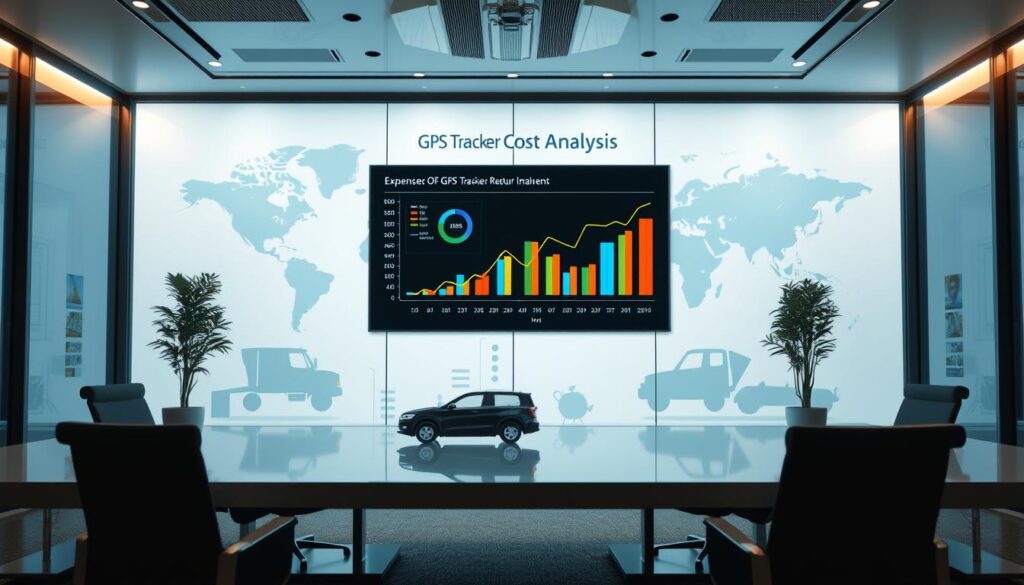
Knowing the costs and possible savings helps businesses decide on GPS tracking. It can lead to big savings and better use of your fleet. So, GPS tracking is a smart choice for companies wanting to improve their vehicle management.
| Cost Factor | Estimated Cost |
|---|---|
| Initial Hardware Expenses | $100-$500 per device |
| Installation Costs | $100-$1,000 per device |
| Monthly Subscription Fees | $20-$50 per vehicle |
Integration with Other Vehicle Security Systems
Car owners can boost their vehicle’s safety by linking GPS trackers with other security systems. This includes alarm systems and immobilizers. GPS tracker integration with alarms sends alerts for any odd activity. This lets owners act fast.
Integrating GPS trackers with vehicle security systems offers many benefits. These include:
- More security features, like anti-theft alerts and geofencing
- Higher chances of recovering stolen vehicles, up to 75%
- Lower insurance costs, thanks to less theft risk
A study showed companies with GPS tracking saw a 30% drop in unauthorized vehicle use. Also, GPS tracking can cut insurance costs by 10-15% because of lower theft risk. Plus, it can speed up finding stolen vehicles by up to 50% compared to old methods.
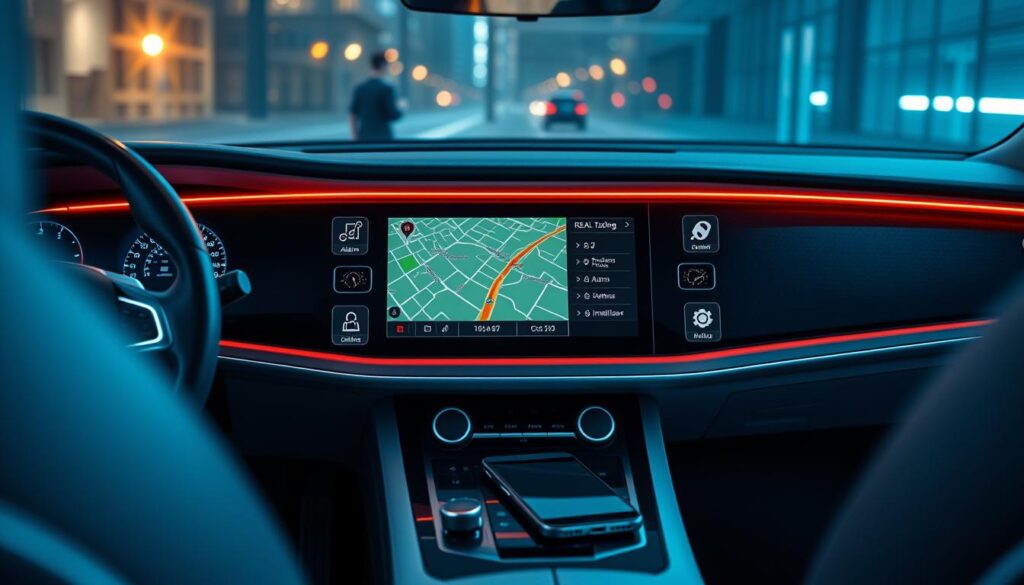
Vehicle security systems, like alarms, can be linked with GPS trackers for better protection. This connection can be made in several ways. Here are a few:
| Method | Description |
|---|---|
| Wired Integration | Direct connection between the GPS tracker and alarm system |
| Wireless Integration | Wireless communication between the GPS tracker and alarm system |
| Cloud-Based Integration | Integration through a cloud-based platform, allowing for remote monitoring and control |
Advanced Features for Enhanced Protection
GPS trackers with advanced features offer better enhanced protection for vehicles. They include driver behavior monitoring and crash detection. These features help prevent accidents and lower theft risks.
These GPS tracker features send real-time alerts and notifications. This lets vehicle owners act fast in emergencies. For instance, a tracker alerts the owner if there’s an accident or reckless driving.
The benefits of these advanced features are clear:
- Improved safety and security
- Reduced risk of vehicle theft
- Enhanced driver behavior monitoring
- Real-time alerts and notifications
Overall, GPS tracker features like driver monitoring and crash detection boost vehicle and owner safety. By choosing a GPS tracker with these advanced features, owners can rest easy knowing their vehicle is safe.

Future of Vehicle GPS Technology
The future of vehicle GPS technology is exciting, with emerging trends and upcoming innovations leading the way. We can look forward to better accuracy, efficiency, and features.
Artificial intelligence and machine learning will soon improve tracking and maintenance. The rise of 5G networks will also speed up data and updates. This will make GPS technology even more reliable and powerful.
Some interesting stats show what’s coming in vehicle GPS technology:
- Self-driving cars will make up over 25% of all vehicles by 2030.
- More than 70% of fleets will use AI-backed GPS tracking in the next five years.
- AI can spot suspicious activities with over 90% accuracy.

As the industry grows, we’ll see more uses of GPS technology. This includes better fleet management and vehicle safety. With the market expected to hit $2.9 billion by 2025, the future looks bright.
Conclusion
As we wrap up our look at GPS trackers for vehicles, it’s clear they’re changing the game for transportation safety. They help keep our loved ones safe and make managing fleets better. GPS trackers are now a must-have in today’s world.
Statistics show how vital these devices are. Teen drivers are three times more likely to be in a fatal crash than older drivers. Thanks to GPS trackers, we can get real-time alerts, set boundaries, and track history. This gives us unmatched peace of mind.
As vehicle security keeps getting better, we’ll see even more cool features. Think of them working smoothly with your car’s systems and predicting when you need maintenance. The future of GPS tracking looks bright, with clear benefits for everyone.
Choosing to get a GPS tracker is more than just protecting your car. It’s about keeping the people and things we care about safe. By using this advanced tech, we help make the roads safer and more connected for everyone.
FAQ
What are GPS trackers for vehicles?
GPS trackers are devices that use Global Positioning System (GPS) technology. They track the location and movement of vehicles in real-time. These devices help ensure vehicle security, monitor fleet operations, and provide valuable insights for individuals and businesses.
How do vehicle GPS trackers work?
Vehicle GPS trackers use GPS satellites to find the device’s location. They then send this information to a monitoring platform, like a mobile app or web-based dashboard. This lets users track their vehicles’ real-time location and movements.
What are the different types of GPS tracking devices for vehicles?
There are several types of GPS tracking devices for vehicles. These include hardwired, battery-powered, and hybrid options. The choice depends on the vehicle type, intended use, and power requirements.
What are the key benefits of using GPS trackers for vehicles?
Using GPS trackers for vehicles offers several benefits. These include reduced insurance costs, improved driver behavior, increased fleet efficiency, and enhanced security through real-time monitoring and alerts.
What are the essential features of modern vehicle GPS trackers?
Modern vehicle GPS trackers have key features. These include real-time location monitoring, geofencing capabilities, mobile app integration, and historical data recording. These features provide users with detailed tracking and monitoring capabilities.
How do I choose the right GPS tracker for my vehicle?
When choosing a GPS tracker, consider several factors. These include the vehicle type, budget, and intended use. It’s important to select a device that meets your specific needs and provides the necessary features and functionality.
How do I install a GPS tracker in my vehicle?
GPS trackers can be installed yourself or by a professional. The right placement and proper installation techniques are key. They ensure the device works effectively and securely.
What security features do GPS trackers offer for my vehicle?
GPS trackers offer enhanced security for vehicles. They provide real-time alerts, geofencing, and remote monitoring. These features help prevent theft and add an extra layer of protection.
How do I manage the battery life and power consumption of my GPS tracker?
The battery life and power management of GPS trackers vary. It depends on the device type, usage patterns, and configuration. Factors like hardwired versus battery-powered options and power-saving modes affect the tracker’s longevity and efficiency.
What types of real-time alerts and notifications do GPS trackers provide?
GPS trackers offer various real-time alerts and notifications. These include speed alerts, movement notifications, and battery status updates. They keep users informed and allow them to take immediate action if needed.
How can GPS tracking benefit fleet management?
GPS tracking greatly benefits fleet management. It improves efficiency, reduces costs, and enhances customer service. Features like real-time vehicle location, driver behavior monitoring, and route optimization are key.
What are the legal considerations and privacy concerns around using GPS trackers?
Using GPS trackers requires awareness of legal requirements and privacy concerns. This includes consent requirementsand data protection laws. It’s important to ensure responsible and compliant usage.
How do I maintain and troubleshoot my GPS tracker?
Proper maintenance and troubleshooting of GPS trackers are essential. This includes regular check-ups, firmware updates, and addressing technical issues. It ensures the tracker continues to perform well.
How do I analyze the cost and return on investment (ROI) of using a GPS tracker?
Evaluating the cost and ROI of a GPS tracker involves several factors. These include the initial investment, monthly service fees, and the long-term value it provides. Improved efficiency, reduced costs, and enhanced security are key considerations.
How can GPS trackers integrate with other vehicle security systems?
GPS trackers can integrate with other vehicle security systems. This includes alarm systems and immobilizers. It provides a complete security solution and enhances vehicle protection.
What advanced features do some GPS trackers offer?
Some GPS trackers offer advanced features. These include driver behavior monitoring, crash detection, and predictive analytics. They provide more detailed vehicle protection and insights.
What is the future of vehicle GPS technology?
The future of vehicle GPS technology looks exciting. It will include advancements like 5G connectivity and artificial intelligence. These will enhance fleet management, predictive maintenance, and real-time decision-making.